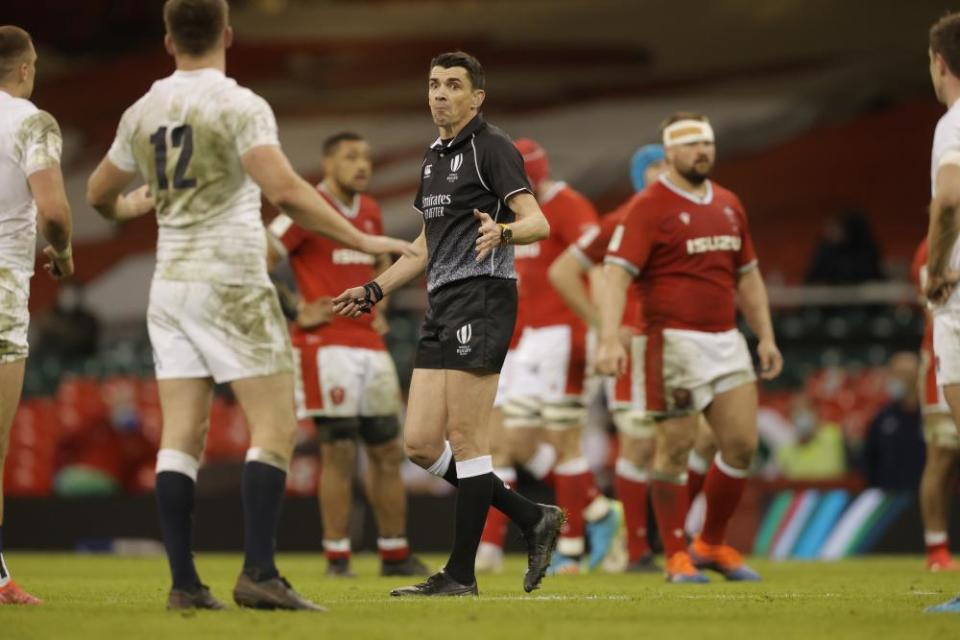Sheedy holds nerve as Wales make England pay in Six Nations thriller

Owen Farrell’s failure to establish a relationship with a pernickety official was a telling factor as England ended the defence of their Six Nations title prematurely and Wales, the new leaders of the table, secured the triple crown. Eddie Jones has consistently deflected questions about Farrell’s captaincy, but on the ground where eight years ago referee Steve Walsh ignored Chris Robshaw but listened to Sam Warburton – who was not Wales’s captain that afternoon – his team’s grand slam hopes disappeared.
It was a helter-skelter, madcap, shapeless match that summed up the unreality of the Covid period. No sooner had one side gained momentum than they surrendered it. But ultimately it was England’s failure to adapt to Pascal Gaüzère’s insistence that players enter a breakdown from behind and remain on their feet that cost them.
Related: Eddie Jones: ‘We cannot blame referee but circumstances difficult to handle’
If Wales’s first two tries were controversial, England’s dreadful discipline in the final quarter cost them after they had fought back to 24-all. They conceded three penalties for the dumbest of offences when they were under no threat that Callum Sheedy converted, before Cory Hill’s try one minute from the end gave Wales a bonus point.
Wales may not have the sleekest or most powerful model in rugby’s showroom, but no one surpasses them for fuel economy. They go the distance and have developed an ability to deal with adversity. The French official may not have been laissez faire and his decision to allow Dan Biggar to take a penalty quickly and kick the ball across the field to Josh Adams for the game’s opening try – when Farrell was speaking to his players about their indisciplined start, as instructed to by Gaüzère, and some had their backs to play – was poor at best. The next time Farrell is given the same order, he will be entitled to say he will wait for the next break in play.

Gaüzère’s call that Louis Rees-Zammit had not knocked on in the build-up to Liam Williams’s try as he went to pick up Adams’s chip in England’s 22 could have gone either way. His argument on review was that the ball went forward on to the back of the wing’s leg before going backwards and hitting the ground. Under the letter of the law, it did not make it a knock forward, but the ball landed at least a metre in front of where the wing’s hands made contact with it.
Gaüzère missed a blatant knock-on by Biggar as the outside-half failed to catch a high kick and allowed play to continue before he was told of his mistake by his team of officials, but England’s disciplinary meltdown in the final quarter was down to them alone. At the point when champions are expected to make their mark, they conceded three needless penalties in nine minutes to puncture their comeback. First, Maro Itoje entered a maul from the side after a lineout, then Ellis Genge went off his feet to prevent Wales from competing for the ball on the floor, and finally Dan Robson obstructed Rees-Zammit as he chased a kick ahead.
Related: Gaüzère wasn’t the only man making mistakes – England made plenty | Andy Bull
None of the positions were threatening and Wales had created little all afternoon. Their opportunist first two tries were followed by their scrum-half, Kieran Hardy, scoring from a quickly taken penalty 15 metres from England’s line after Jonny Hill, with complete disregard for the way Gaüzère had controlled the breakdown, dived through a ruck.
England may have had a suspicion that Gaüzère was watching them more than Wales at the start, with Itoje giving away three of their first four penalties as he tested the referee’s tolerance threshold and found it was very low. But they failed to react to his demand that players enter a breakdown from the side and remain on their feet. It was like 2018 when England’s title defence ended at the breakdown where they were regularly penalised, and if stupidity is defined as doing the same thing over again and expecting a different outcome, they are bottom of the class.
The pity for England was that they played their most fluent rugby since they faced Wales at Twickenham a year ago. Elliot Daly was a threat at full-back, Henry Slade found space in the midfield, the two wings were constantly involved and the forwards joined in handling moves. But at times they looked as if they were in the act of waking up, not quite with it.

Wales started the tournament low on confidence after a wretched 2020 but under the gaze of their former head coach, Warren Gatland, in his capacity as Lions supremo, they built on their victories on the opening two weekends against Ireland and Scotland, both of whom had a man sent off. If Wales are enjoying the luck that deserted them last year, they have again become hard to knock over.
The hosts were never behind here, taking the lead after five minutes through a Biggar penalty, and striking back after England had whittled away leads of 11 points and 10 in either half.
And in the likes of Taulupe Faletau, Josh Navidi and Alun Wyn Jones, they had players who looked in control while England too often appeared rudderless.
The champions’ two tries were scored by Anthony Watson after a crisp handling move and Ben Youngs, who noticed space at the side of a ruck, and they were denied three times by Wales’s scrambling defence, but the end summed England up. On the trail of a bonus point when they gave away possession, Sheedy kicked to the line for Rees-Zammit to chase. He outpaced Jonny May, but rather than picking up the ball he twice hacked it on towards the line only for the awkward bounce to favour George Ford, who knocked the ball on. Cory Hill scored from the resulting scrum to hand Wales 40 points against England for the first time and secure the triple crown. Wales’s only disappointment was that there were no supporters to revel in the victory. So they picked up the trophy to a pre-recorded roar, which, as Tom Jones did not sing, is unusual.

 Yahoo News
Yahoo News 
